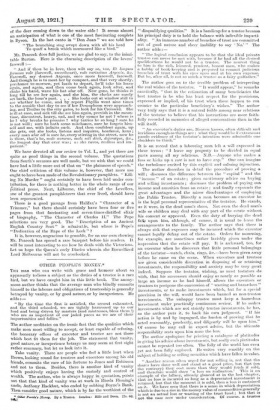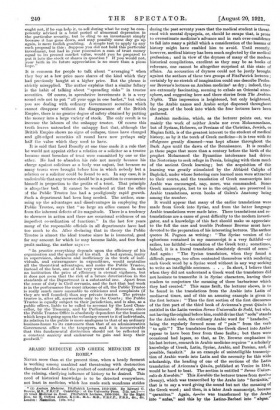OTHER PEOPLE'S MONEY.*
Tax man who can write with grace and humour about so apparently tedious a subject as the duties of a trustee is a rare bird, but we have caught him in this little book. The anony- mous author thinks that the average man who blindly commits himself to the labours and obligations of trusteeship is generally
betrayed by vanity, or by good nature, or by inexperience. He adds:
" By the time the first is satisfied, the second exhausted, and the third schooled, we are tightly harnessed up to our load and being driven by masters (and mistresses, bless them !) who are as impatient of our jaded paces as wo are of their importunities and follies."
The author meditates on the ironic fact that the qualities which make men most willing to accept, or least capable of refusing, the honorary offices of executor and trustee are not those -which best fit them for the job. The statement that vanity, good nature, or inexperience betrays us may seem at first sight rather summary, but let us look into it.
Take vanity. There are people who feel a little hurt when Brown, looking round for trustees and executors among his old friends, commits the care of his fortune to Jones and Robinson
and not to them. Besides, there is another kind of vanity which positively enjoys having the custody and control of
wealth. The author, who is always happy in quotation, points out that that kind of vanity was at work in Rhoda Fleming's uncle, Anthony Hackbut, who ended by robbing Boyne's Bank. Then consider good nature, which is by far the worthiest of the • 1Other Peanies Money. By a Trustee. London: Mills and Boon. Ms. dd. 1:01: " disqualifying qualities." It is a handicap for a trustee because his principal duty is to hold the balance with inflexible imparti- ality. " An immense number of breaches of trust are committed
out of good nature and sheer inability to say No.' " The author adds :—
" The logical conclusion appears to be that the ideal private trustee can never be met with, because if he had all the desired qualifications he would not bo a trustee. The nearest thing to him is the rich, leisured, prudent, honest man, who makes a hobby of book-keeping and is prepared to commit judicious breaches of trust with his eyes open and at his own expense. But he, after all, is not so much a trustee as a fairy godfather."
The author goes on to the terrible problem of interpreting the real wishes of the testator. " It would appear," he remarks caustically, " that in the estimation of many beneficiaries tho
best trustee is he who has least respect for the provisions, expressed or implied, of his trust when these happen to run counter to the particular beneficiary's wishes." The author very truly says that it is a natural foible among near relations of the testator to believe that his instructions are more faith- fully recorded in memories of alleged conversations than in the will itself.
" An executor's duties are, Heaven knows, often difficult and invidious enough as things are : what they would be if extraneous parole evidence of the testator's intention were admissible one shudders to think."
It is on record that a labouring man left a will expressed in these terms : " I leave my property to be divided in equal parts among all my relations. N.B.—Anyone who makes a fuss or kicks up a row is not to have any." One can imagine the turbulence excited by this explicit and calming injunction.
The author describes in detail the procedure of proving a will ; discusses tho difference between the " capital " and the " income " of an estate ; gives cautionary advice on buying and selling investments ; discusses the problem of paying out
income and annuities from an estate ; and finally expounds the great advantages and the minor disadvantages of employing the Public Trustee. Directly a man becomes an executor ho is the legal personal representative of the testator. He stands, as it were, in the dead man's shoes. Not even the dead man's wife or children may deal with any part of the estate without his consent or approval. Even the duty of burying the dead falls upon him, although, of course, it is usual to leave the arrangements to the family. Tho author says that there is always risk that expenses may be incurred which the executor cannot legally defray out of the estate. Orders for mourning, for example, are sometimes rather lavishly given under tho impression that the estate will pay. It is awkward, too, for an executor when he discovers that little personal belongings of the testator—watch, chain, rings, &c.—have been given away before ho came on the scene. When executors and trustees are given considerable discretion in disposing of or retaining investments, the responsibility and anxiety may be very groat indeed. Suppose the testator, wishing, as most testators do wish, that his successors should enjoy as nearly as possible as large an income as he had himself, allows the executors or trustees to postpone the conversion of " wasting and hazardous " investments, or to make investments which, but for a special provision in the will, would have been banned as non-trustee
investments. The unhappy trustee must keep a hazardous investment under practically continuous review. If ho makes investments which are not strictly trustee investments, ho
as the author puts it, to back his own judgment. " If his action is by and by impugned, the burden of proving that ho acted reasonably, prudently, and diligently will be upon him." Of course ho may call in expert advice, but the ultimate responsibility rests upon him none the less. The author apologizes for printing a catalogue of platitudes in giving his advice about investments, but really such platitudes cannot be repeated too often. The folly of the world has even yet not been fully explored. He writes very sensibly on the subject of holding or selling securities which have fallen in value.
" Another reason often urged for not selling is, not that the shares have done well and stand at a good price, but that (on the contrary) they cost more than they would fetch if sold, and therefore would show ' a loss on realisation.' This is an example of the fallacy, already glanced at in the last chapter, that no loss is incurred so long as a depreciated investment is retained, but that the moment it is sold, then a loss is sustained on it. We have seen that there is a sense in which depreciation which is due to a rise in the money value of commodities generally is not an actual loss or wasting of the trust fund ; but that is not the case now under consideration. Of course. a trustee
ought not, if he can help it, to sell during what he may be com-
petently advised is a help period of abnormal depression in the particular security, but to cling to an investment simply because it has gone down, and may possibly some day go up again, is mere foolish gambling. A simple test to apply to any such proposal is this : Suppose you did not hold this particular investment, but had in your possession a sum of trust money equal to its present market value, would you be prepared to put it into the stock or shares in question ? If you would not, your faith in its future appreciation is no more than a pious hope."
It is common for people to talk about " averaging " when they buy at a low price more shares of the kind which they had previously bought at a higher price. But the phrase is strictly misapplied. The author explains that a similar fallacy is the habit of talking about " spreading risks " in trustee securities. Of course, in speculative investments it is a very sound rule not to put " all your eggs in one basket," but when you are dealing with ordinary Government securities which cannot disappear without the disappearance of the British Empire, there is no greater degree of safety obtained by putting the money into a large variety of stock. The only result is to increase the labours of the unhappy trustee. Of course this truth leaves untouched the unhappy fact that, although the British Empire shows no signs of collapse, times have changed and gilt-edged securities all round have now perhaps only half the value which they used to have.
It is said that Lord Romilly at one time made it a rule that he would not appoint either a relation or a solicitor as a trustee because most breaches of trust were committed by one or the other. He had to abandon his rule not merely because his charge against solicitors as a body was unjust, but because so many trusts were brought before him in which nobody but a relation or a solicitor could be found to act. In any case, it is undesirable that any trustee should be in a position to remunerate himself in proportion to the profits of a trust. That principle is altogether bad. It cannot be wondered at that the office of the Public Trustee has had a prodigiously rapid growth. Such a department had been long needed. The author, sum- ming up the advantages and disadvantages in employing the Public Trustee, says that "so large an office cannot be free from the inherent defects of its magnitude. There is a tendency to slowness in action and there are occasional evidences of an imperfect co-ordination of functions." In the last few years many of the responsible officials in all departments have had too much to do. After declaring that in theory the Public Trustee is almost the ideal trustee since he is immortal, good for any amount for which he may become liable, and free from profit-making, the author says :-
" In practice everything depends upon the efficiency of his organisation and the quality of his staff. A bad system, laxity in supervision, slackness and inefficiency in the work of indi- viduals, and extravagance in expenditure, would neutralise all the theoretical advantages, and make the Public Trustee, instead of the best, one of the very worst of trustees. In such an institution the price of efficiency is eternal vigilance, but it does not seem that the risk of a futuro deterioration in the standards of the Department is a substantial one. Apart from the sense of duty in Civil servants, and the fact that bad work is in the performance the most irksome of all, the Public Trustee is really much more amenable to criticisms and complaints (if they are well founded) than any private trustee. The private trustee is, after all, answerable only to the Courts ; the Public Trustee is equally subject to their jurisdiction, and is also, as a public officer, liable to be called to account by the Lord Chan- cellor, by the Treasury, and by Parliament. Moreover, since the Public Trustee Office is absolutely dependent for the business which keeps it going upon the voluntary resort to it of individuals, its relation to the public is more analogous to that of an ordinary business-house to its customers than that of an administrative Government office to the taxpayers, and it is inconceivable that this fundamental distinction should not be reflected in a constant anxiety and endeavour to gain and keep their goodwill."



































 Previous page
Previous page